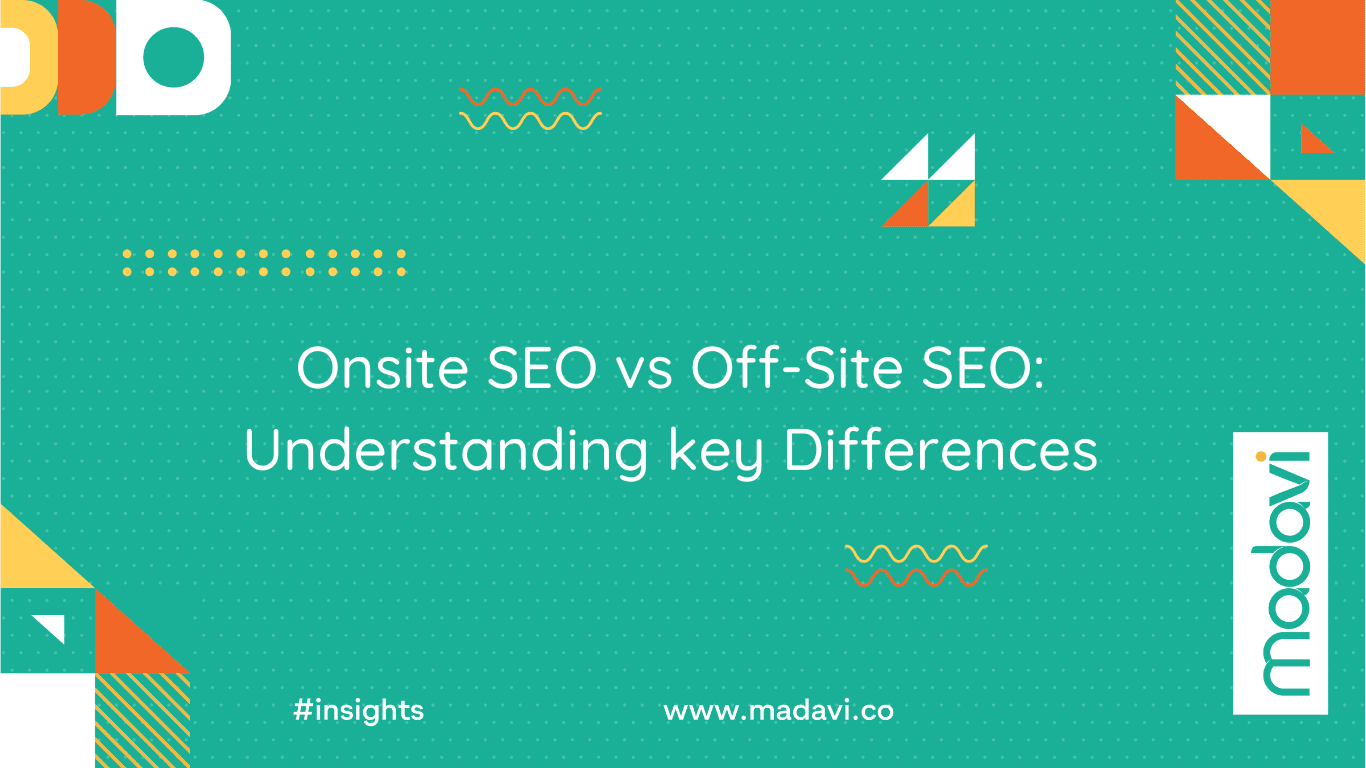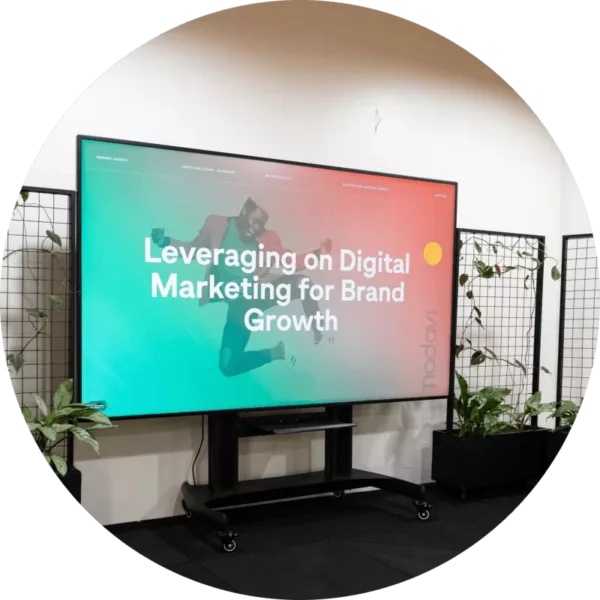Table of Contents
Onsite SEO and offsite SEO are two essential components of search engine optimization. Offsite SEO refers to the actions taken outside of a website to improve its search engine ranking, while onsite SEO refers to the actions taken within the website itself. Both are crucial for a successful SEO strategy.
Onsite SEO, also known as on-page SEO, involves optimizing the content and structure of your website to make it more search engine-friendly. This includes optimizing your website’s meta tags, titles, headings, URLs, images, and content. Onsite SEO is vital because it helps search engines understand the relevance and value of your website’s content.
Offsite SEO, or off-page SEO, involves building backlinks to your website from other high-quality websites. Backlinks are links from other websites that point to your website. The more high-quality backlinks you have, the more authoritative and trustworthy your website appears to search engines. Offsite SEO is vital because it helps search engines understand the popularity and authority of your website.
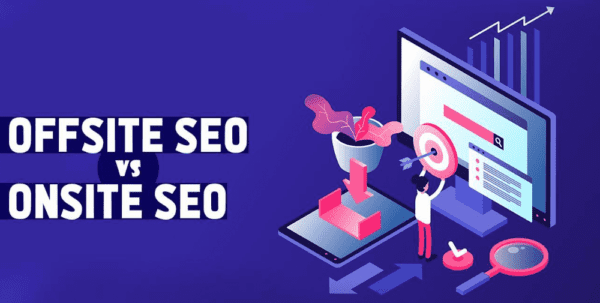
Key Takeaways
- SEO is optimizing your website to rank higher in search engine results pages (SERPs).
- Onsite SEO involves optimizing the content and structure of your website to make it more search engine-friendly.
- Offsite SEO involves building backlinks to your website from other high-quality websites.
Understanding SEO
Search Engine Optimization (SEO) is optimizing your website to rank higher in search engine results pages (SERPs). This involves a variety of techniques, including both onsite and offsite optimization.
Onsite SEO
Onsite SEO, or on-page SEO, makes your website search engine-friendly. When you use this strategy, you focus on optimizing elements on your website that will help you rank higher in the search results and drive more valuable traffic.
This SEO practice requires adjusting elements on your website so search engines can easily crawl your site and index your content.

Some essential onsite SEO techniques include:
- Keyword research and optimization involves identifying the keywords and phrases users search for and incorporating them into the website’s content and meta tags.
- Content optimization includes creating high-quality, relevant, and engaging content that meets users’ needs and aligns with the website’s goals.
- Title tags and meta descriptions: These HTML elements summarise the website’s content and help search engines understand what it’s about.
- Header tags: These are HTML tags that indicate the structure of the content and help search engines understand its hierarchy.
- Internal linking: This involves linking to other pages within the website to help users navigate and search engines understand the website’s structure.
- Site speed and mobile-friendliness: These technical factors can impact a website’s rankings and user experience.

Importance of Onsite SEO
When optimizing your website for search engines, onsite SEO is critical since it involves strategies and techniques you use on your website to make it more search-engine friendly. Here are some of the essential reasons why it is crucial:
Keyword Optimization
One of the most important aspects of onsite SEO is keyword optimization. This involves identifying the keywords and phrases your target audience uses to search for products or services like yours and then incorporating those keywords into your website content.
By optimizing your website for the right keywords, you can improve your chances of ranking higher in search engine results pages (SERPs) for those keywords. This, in turn, can drive more targeted traffic to your website and increase your chances of converting those visitors into customers.
Meta Descriptions
Another critical aspect of onsite SEO is meta descriptions. Meta descriptions are the snippets of text that appear below the title tag in search engine results pages. They provide a summary of your webpage and can help entice users to click through to your website.
By optimizing your meta descriptions with relevant keywords and compelling language, you can improve your click-through rates and attract more targeted traffic to your site.

URL Structure
The structure of your website’s URLs can also impact your onsite SEO. Ideally, your URLs should be short, descriptive, and include relevant keywords. This can help search engines understand what your pages are about and improve your chances of ranking higher in SERPs.
In addition to these factors, you can use many other onsite SEO strategies and techniques to improve your website’s search engine visibility. By focusing on onsite SEO, you can create a more search engine-friendly website that attracts more targeted traffic and helps you achieve your business goals.
Offsite SEO
Offsite SEO optimizes external factors influencing your website’s ranking, such as backlinks and social media presence. Building a solid offsite SEO strategy can improve your website’s authority and credibility, making it more likely to rank higher in search engine results.
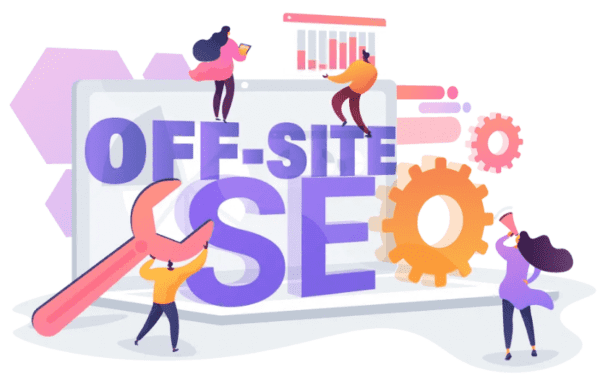
image source
Some essential offsite SEO techniques include:
- Link building: acquiring high-quality backlinks from other reputable websites.
- Social media optimization: building a solid social media presence and promoting your website through social media channels.
- Local SEO: optimizing your website for local search results, keywords, and business listings.
A strong SEO strategy involves a combination of both onsite and offsite optimization techniques. By implementing these techniques effectively, you can improve your website’s visibility, attract more traffic, and ultimately achieve higher rankings in search engine results pages.
Significance of Offsite SEO
Offsite SEO refers to the actions taken outside of your website to improve its search engine rankings. It includes link building, social media marketing, and other promotional methods that aim to increase the authority and trustworthiness of your website. Here are two critical factors that make offsite SEO crucial for your website’s success:
Backlinks
Backlinks are links from other websites that point to your website. They are one of the most important ranking factors for search engines because they indicate that other websites consider your content valuable and relevant. The more high-quality backlinks you have, the higher your website will likely rank in search engine results pages (SERPs).
However, not all backlinks are created equal. Search engines also consider the authority and relevance of the linking website. A backlink from a high-authority website in your niche is more valuable than a backlink from a low-quality website. Therefore, building high-quality backlinks from relevant and authoritative websites is essential.

Social Signals
Social signals refer to the likes, shares, and comments your website receives on social media platforms such as Facebook, Twitter, and LinkedIn. Search engines consider social signals a ranking factor because they indicate that your content is popular and engaging.
Social signals can also indirectly improve your website’s search engine rankings by driving traffic. When people share your content on social media, it’s more likely to reach a wider audience and attract more visitors to your website. This, in turn, can increase your website’s authority and trustworthiness in the eyes of search engines.
In a nutshell, offsite SEO is crucial for improving your website’s search engine rankings and driving more traffic. By building high-quality backlinks and engaging with your audience on social media, you can improve your website’s authority and relevance in your niche and, ultimately, rank higher in search engine results pages.

Effective Strategies for Offsite SEO
There are many effective strategies for improving offsite SEO. One of the most important is link building. Link building involves getting other websites to link back to your website. The more high-quality backlinks a website has, the more likely it is to rank higher in SERPs.
Another effective offsite SEO strategy is social media marketing. Social media platforms like Facebook, Twitter, and LinkedIn can be used to promote a website’s content and engage with potential customers. Social media shares and mentions can also help improve a website’s offsite SEO.

Content marketing is another crucial offsite SEO strategy. A website can attract backlinks and social media shares by creating high-quality content that is informative and engaging. This can help improve a website’s offsite SEO and increase its visibility in SERPs.
SEO Best Practices(linking onsite SEO and offsite SEO)
When it comes to SEO, there are certain best practices that you should follow to ensure your website is optimized for search engines. Two important areas to focus on are onsite SEO and offsite SEO.

Quality Content
Consistency in content creation is vital to maintaining relevance and authority in your niche, and regularly publishing new material signals to search engines that your site is active and dynamic. It provides value to your audience, keeping them coming back for more. Implementing a content calendar can be instrumental in staying organized and ensuring a steady flow of relevant, high-quality content. By strategizing and scheduling your content updates, you can maintain a consistent presence and cater to your audience’s expectations.
Also, diversifying your content formats can enhance user experience and widen your reach. Incorporating various media types such as videos, infographics, podcasts, or interactive tools can captivate different segments of your audience and cater to diverse learning preferences. This multifaceted approach enriches your site and bolsters its appeal, making it more shareable across other platforms and increasing its visibility in search results. Experimenting with different content formats allows you to explore what resonates best with your audience, refining your content strategy for optimal engagement and SEO performance.
User Experience
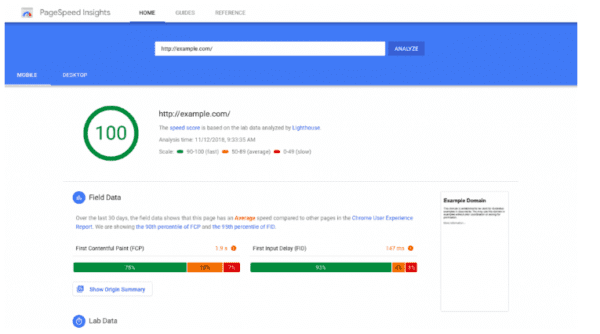
In conclusion, a comprehensive and effective search engine optimization (SEO) strategy involves harmoniously integrating onsite and offsite optimization techniques. Onsite SEO, encompassing keyword optimization, meta descriptions, URL structure, and user experience, ensures that a website’s content is relevant, engaging and structured so that search engines can readily understand and rank. This internal optimization is the bedrock that sets the stage for offsite SEO to thrive.
Offsite SEO, driven by factors such as backlinks and social signals, extends a website’s reach and credibility beyond its domain. Building high-quality backlinks from reputable sources establishes the website as authoritative and trustworthy in the eyes of search engines, ultimately influencing its ranking in search results. Meanwhile, social signals enhance the website’s visibility and popularity, further solidifying its online presence. In tandem, these onsite and offsite SEO strategies form a robust foundation for websites to climb the ranks of search engine results, attract targeted traffic, and achieve sustainable online success.


